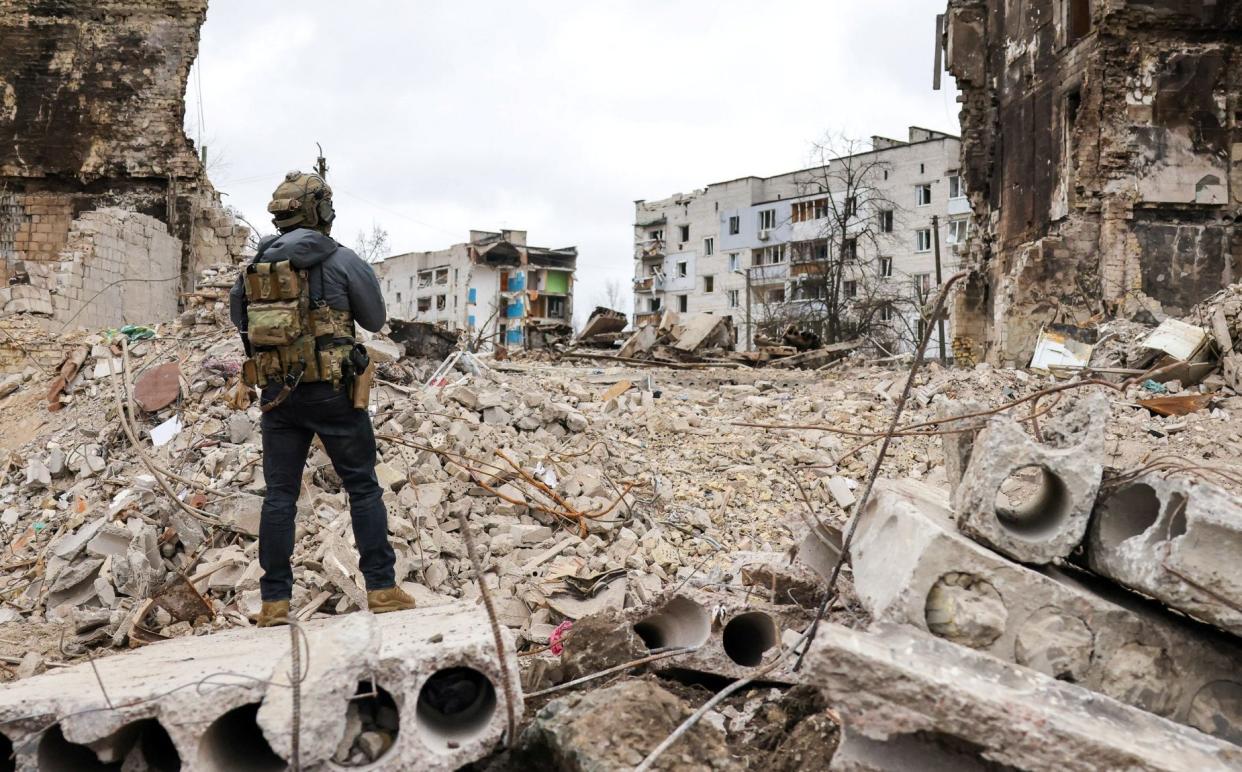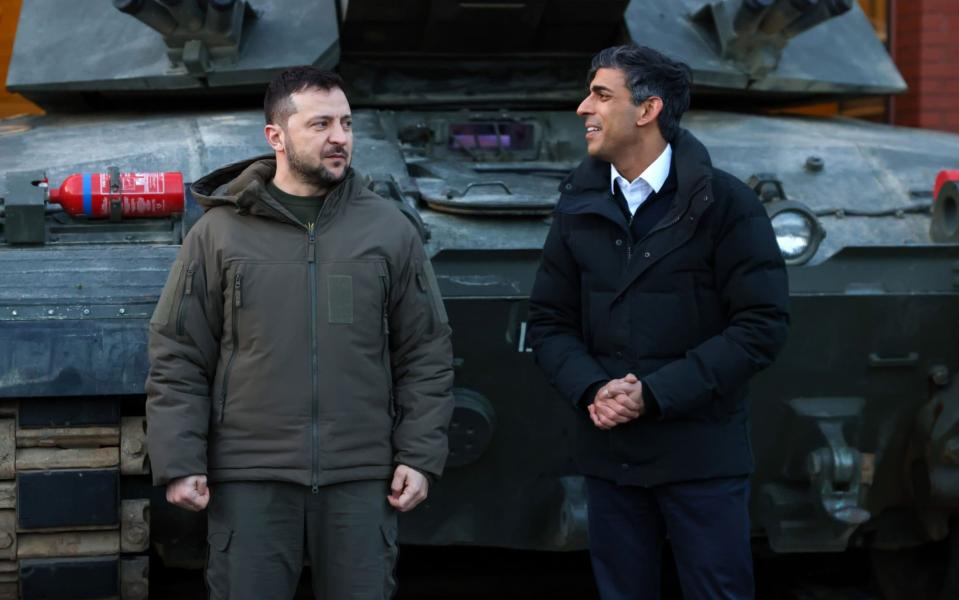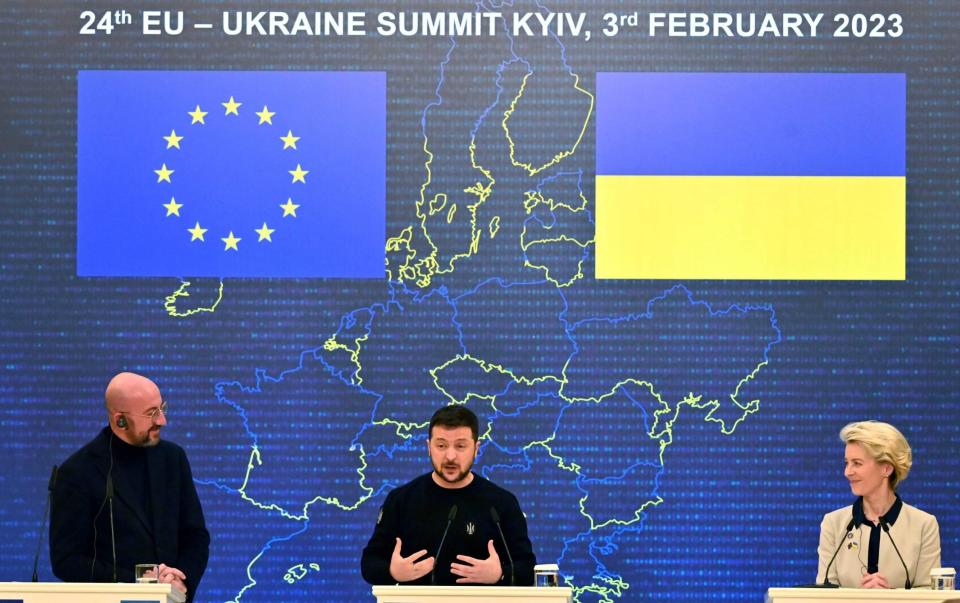The first phase of Putin’s war is over – now the West needs a new strategy

- Oops!Something went wrong.Please try again later.
A swift Russian victory, with its troops parading in victory through the streets of Kyiv. A collapse of power in the Kremlin, with Vladimir Putin despatched in a palace coup. Or perhaps even a quickly negotiated peace settlement, with small parcels of land changing hands as the borders were redrawn.
When Russian troops moved across the frontier a year ago this week, there were plenty of different possible outcomes to the war. There was one, however, that we did not expect. An endless war of attrition.
And yet, 12 months later, that is what we have arrived at. Both sides have dug in for a long fight across a stretched front line, the likes of which Europe has not witnessed since the First World War. To survive that, and eventually triumph, Ukraine is going to need a lot of weapons, but it will need something else as well. An economic plan.
A war of attrition is very expensive, and Ukraine was hardly a rich country to start with. It is going to need plenty of financial assistance; massively increased trade with the rest of Europe through opening up our markets; and lots of investment in the bulk of the country not caught up in the fighting.
The West has done well so far at providing military help – but there is still very little sign of an economic plan for the battered country.

The losses Ukraine has suffered in the year since Vladimir Putin’s brutal invasion of the country on February 24 last year are mainly counted in the dead and wounded of its heroic armed forces, and the devastating damage to its towns and villages. But there is no escaping one simple fact. Its economy has been devastated as well.
In 2022, its GDP shrank by 30pc according to the economy ministry. It was not exactly wealthy to start with, with a pre-invasion GDP of $200bn (£167bn). Factories have been destroyed. Power stations have been bombed out of action. Road and rail links have been shattered, and access to the Black Sea, the main artery for its commodity exports has become sporadic.
An exodus of refugees, with an estimated five million Ukrainians now living abroad, has meant critical shortages of labour. It is, to put it mildly, a difficult place to do business.
Even so, a war of attrition means there has to be a functioning economy to support the billions the Government has to spend every year on men and equipment for the frontline. Indeed, wars of attrition are generally won by the side with the strongest economy. Where is that going to come from?
True, in the short term it can come from loans and grants from Europe and the United States. In the medium-term, however, Ukraine will need to start supporting itself. And that will mean plenty of help from the rest of the world. Such as? Here are three places we should start.
First, Ukraine is going to need massive amounts of straightforward financial support. The European Union last year pledged $18bn in emergency aid for the country, and the International Monetary Fund (IMF) has lent more than $1bn. It is enough for it to pay its bills for now. And yet Ukraine will not be able to survive just on handouts, nor are loans, no matter how soft the terms, appropriate for a country that has lost a third of its output in a single year.
Even with a projected growth rate of 2pc this year, it will take decades for it to claw its way back to where it was before the invasion. In reality, Ukraine needs simple, no-strings cash transfers running into tens of billions every year to make up for all its lost output. One place to start would be with the frozen assets of Putin’s oligarch cronies. One or two yacht sales would fund a lot of reconstruction – and would put the money to appropriate use.
Next, trade. Ukraine needs to be able to export its way out of trouble as quickly and easily as possible. There is no excuse for any trade barriers to remain in place, or for any tariffs on Ukranian goods. It is easy to talk about membership of the EU, but realistically that is still a long way off.

Most import restrictions were lifted last year, but shockingly there is talk of reimposing them in the EU after complaints of unfair competition from its farmers. That is unacceptable. The more we buy from Ukraine the better, and if some of our agricultural producers suffer then so be it. We can compensate them in other ways if necessary.
Finally, investment. Western companies should be building factories, IT centres, research labs, and distribution centres in the regions of the country that are largely insulated from the fighting. All it would take would be a handful of major companies to lead the way.
Sure, they might be worried about war damage, and that is understandable. But it would be simple to offer state backed insurance to pay for that, and it would be a statement of the West’s commitment to the country if more giant firms had operations there while at the same time exiting from Russia.
Britain has been in the vanguard of military support for Ukraine, leading the donation of weapons and ammunition, and encouraging other countries to do as much as they can. It was a good start, and it was the right response for the first phase of the war.
Over the coming year, however, we should be leading the economic package as well, building a coalition of financial and trading partners that can help build a wartime economy durable to survive what now looks as if it will be a long fight. In reality, if the war is going to last for years, then we need an economic as well as a military strategy – and the hard work on making that happen needs to start now.

